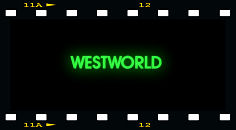 The future: vacationgoers flock to Delos, where, for a thousand dollars a day, they can experience the dangers and delights of bygone eras in one of three large-scale simulations populated entirely by robots – Medieval World, Roman World, or Western World. Chicago lawyer Peter Martin decides to give the old west a try, and meets John Blane, a fellow vacationer who has visited Western World in the past, on the hovercraft flight to Delos. When they arrive, they don appropriate old west clothes and are issued real six shooters, though they’re modified so the vacation-goers can’t shoot each other, only the robots. Outfitted for their new lives as lawless cowboys, Martin and Blane step into…
The future: vacationgoers flock to Delos, where, for a thousand dollars a day, they can experience the dangers and delights of bygone eras in one of three large-scale simulations populated entirely by robots – Medieval World, Roman World, or Western World. Chicago lawyer Peter Martin decides to give the old west a try, and meets John Blane, a fellow vacationer who has visited Western World in the past, on the hovercraft flight to Delos. When they arrive, they don appropriate old west clothes and are issued real six shooters, though they’re modified so the vacation-goers can’t shoot each other, only the robots. Outfitted for their new lives as lawless cowboys, Martin and Blane step into…
The Old West: The frontier of 1880s America proves to be less luxurious than Martin expects. But after his first shootout with a mysterious gunslingers – a robot, of course – he begins to see the appeal; when Blane introduces him to robot women programmed to submit to paying customers’ sexual advances, he sees even more appeal. Other vacationers in the Roman and Medieval Worlds experience similar delights with a clear conscience, since the “locals” they are fighting, killing, or seducing are merely robots; any robots “killed” in action are repaired and returned to their scenarios. But some of the robots show increasing signs of malfunction, including disobeying their programming. The freshly repaired mysterious gunslinger kills Blane and pursues Martin even beyond the boundaries of Western World. Martin has no future to return to unless he can escape or find a way to kill his seemingly impervious pursuer.
written by Michael Crichton
directed by Michael Crichton
music by Fred Karlin
Cast: Yul Brynner (The Gunslinger), Richard Benjamin (Peter Martin), James Brolin (John Blane), Norman Bartold (Mediaval Knight), Alan Oppenheimer (Chief Supervisor), Victoria Shaw (Medieval Queen), Dick Van Patten (Banker), Linda Scott (Arlette), Steve Franken (Technician), Michael Mikler (Black Knight), Terry Wilson (Sheriff), Majel Barrett (Miss Carrie), Anne Randall (Daphne), Julie Marcus (Girl in dungeon)
Notes: The opening “TV interview” segment setting up the movie’s backstory was a very late addition to the movie, and was written by a non-union advertising executive due to a Writers’ Guild strike taking place late in production. Having scored a success with The Andromeda Strain (adapted from his own novel), Crichton made his big-screen directing debut here in addition to having written the script. (He had already directed a TV movie called Pursuit which had aired in 1972 on ABC.) With MGM calling the shots on casting, budget, and a final edit of the script, Crichton had only a month and a little over a million dollars to shoot Westworld. (Despite this, Richard Benjamin, better known for comedy roles, considers it one of his better movie-making experiences. Benjamin would go on to star in the ’70s NBC sci-fi spoof, Quark.)
Westworld also offers a rare non-Star-Trek role for Majel Barrett, the wife of Star Trek creator Gene Roddenberry. Yul Brynner appears in one of his final film roles before returning to the stage full-time; he would put in a cameo appearance in 1976’s sequel film, Futureworld, which which Crichton was not involved even at the story level.
LogBook entry and review by Earl Green
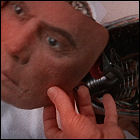 Review: A fascinatingly prototypical early ’70s science fiction film, Westworld has it all – Peckinpah-esque bloodshed, computers/robots turning against their masters, and a friendly warning that hedonism will kill you. All of this is wrapped into a package that pokes gentle fun at the traditional western, but successfully disguises that fact until late in the story. (Crichton deliberately chose to mimic the traditional staging and camera work of past westerns to lull the audience into a false sense of security.)
Review: A fascinatingly prototypical early ’70s science fiction film, Westworld has it all – Peckinpah-esque bloodshed, computers/robots turning against their masters, and a friendly warning that hedonism will kill you. All of this is wrapped into a package that pokes gentle fun at the traditional western, but successfully disguises that fact until late in the story. (Crichton deliberately chose to mimic the traditional staging and camera work of past westerns to lull the audience into a false sense of security.)
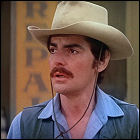 Richard Benjamin is surprisingly good as the audience “viewpoint character”, an inoffensive everyman who steps into a bizarre situation but grabs all of its opportunities with both hands once he figures out that the game is rigged in his favor. But – largely due to his prominence in the hit The Magnificent Seven – Yul Brynner gets star billing over Benjamin for a role in which he has perhaps five lines of dialogue. Modern reviewers have a habit of comparing Brynner’s robotic gunslinger to the Terminator, and there’s some truth to that, but Brynner got there first. And in any case, Brynner’s performance seems to have inspired not Schwarzenegger, but Robert Patrick in Terminator 2. Like Patrick’s nondescript police-uniformed T-1000, Brynner is not terribly physically imposing here (he even displays a bit of paunch – he’s a well-fed robot). These days the role would be cast quite differently, but that unassuming appearance is key to the character’s menace.
Richard Benjamin is surprisingly good as the audience “viewpoint character”, an inoffensive everyman who steps into a bizarre situation but grabs all of its opportunities with both hands once he figures out that the game is rigged in his favor. But – largely due to his prominence in the hit The Magnificent Seven – Yul Brynner gets star billing over Benjamin for a role in which he has perhaps five lines of dialogue. Modern reviewers have a habit of comparing Brynner’s robotic gunslinger to the Terminator, and there’s some truth to that, but Brynner got there first. And in any case, Brynner’s performance seems to have inspired not Schwarzenegger, but Robert Patrick in Terminator 2. Like Patrick’s nondescript police-uniformed T-1000, Brynner is not terribly physically imposing here (he even displays a bit of paunch – he’s a well-fed robot). These days the role would be cast quite differently, but that unassuming appearance is key to the character’s menace.
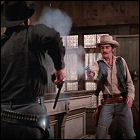 Westworld never really comes right out and tells you what exactly the rapidly-spreading malfunction is – is it sentience? Are the robots fed up with being sex slaves and punching bags? (Think of it as populating the planet from the Star Trek episode Shore Leave with artificial constructs who suddenly demand dignity.) Is it a computer virus from inside or outside Delos (and where would that have come from)? There are lots of potential avenues for storytelling and allegory there, and HBO’s series reboot of Westworld looks like it will address many of those. The movie leaves many potential opportunities for allegory on the floor – it seems to be trying to consciously avoid being about anything.
Westworld never really comes right out and tells you what exactly the rapidly-spreading malfunction is – is it sentience? Are the robots fed up with being sex slaves and punching bags? (Think of it as populating the planet from the Star Trek episode Shore Leave with artificial constructs who suddenly demand dignity.) Is it a computer virus from inside or outside Delos (and where would that have come from)? There are lots of potential avenues for storytelling and allegory there, and HBO’s series reboot of Westworld looks like it will address many of those. The movie leaves many potential opportunities for allegory on the floor – it seems to be trying to consciously avoid being about anything.
But if you want to dig and interpret a bit, there is some meat here. Long before it was part of the 21st century American cultural conversation, there’s an implied point made by Westworld about privilege. Though there’s a typically ’70s undercurrent of “hedonism will get you in the end”, there 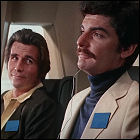 are hints of something else: the thousand-dollar-a-day cost of going to Delos sets a high bar to entry. Richard Benjamin’s character is a lawyer; Dick Van Patten’s blink-and-you’ll-miss-him role is billed simply as a banker. Westworld sets up a world where the privileged few get to have free reign at the expense of those “beneath” them. Furthermore, the robots are created expressly for the purpose of being subject to their every whim – a permanent, disadvantaged, enforced underclass. The script carefully avoids planting the idea of a robot civil rights movement – a topic that, in 1972/73, probably fell under the “too soon” category. The fact that the movie can be viewed in the 21st century and these barely-under-the-surface meanings can be extracted from it may also place it under the “too late” category; again, the 21st century cable TV remake has a lot of raw material to work with from the movie’s unprocessed ore.
are hints of something else: the thousand-dollar-a-day cost of going to Delos sets a high bar to entry. Richard Benjamin’s character is a lawyer; Dick Van Patten’s blink-and-you’ll-miss-him role is billed simply as a banker. Westworld sets up a world where the privileged few get to have free reign at the expense of those “beneath” them. Furthermore, the robots are created expressly for the purpose of being subject to their every whim – a permanent, disadvantaged, enforced underclass. The script carefully avoids planting the idea of a robot civil rights movement – a topic that, in 1972/73, probably fell under the “too soon” category. The fact that the movie can be viewed in the 21st century and these barely-under-the-surface meanings can be extracted from it may also place it under the “too late” category; again, the 21st century cable TV remake has a lot of raw material to work with from the movie’s unprocessed ore.
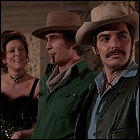 There’s also strong connecting conceptual tissue to Crichton’s later novel-turned-movie Jurassic Park, whose isolated high-tech amusement park is populated with genetically engineered dinosaurs instead of artificially constructed robots. The attraction doesn’t quite work as advertised to its hapless visitors in either case. Jurassic Park seemed to clearly advocate not messing with nature, but in the end it may be Westworld that has the more nuanced message.
There’s also strong connecting conceptual tissue to Crichton’s later novel-turned-movie Jurassic Park, whose isolated high-tech amusement park is populated with genetically engineered dinosaurs instead of artificially constructed robots. The attraction doesn’t quite work as advertised to its hapless visitors in either case. Jurassic Park seemed to clearly advocate not messing with nature, but in the end it may be Westworld that has the more nuanced message.
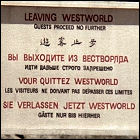 Westworld is fun and fast-paced, obviously of its time and yet still tantalizing – sometimes as much for what it doesn’t say as what it does say. There’s a lot of potential for a remake here, though it should be noted that critical disdain was heaped upon two early attempts to follow up on Westworld: 1976’s Futureworld, and a mercifully brief 1980 TV series. A return to Westworld is full of potential…and potential pitfalls.
Westworld is fun and fast-paced, obviously of its time and yet still tantalizing – sometimes as much for what it doesn’t say as what it does say. There’s a lot of potential for a remake here, though it should be noted that critical disdain was heaped upon two early attempts to follow up on Westworld: 1976’s Futureworld, and a mercifully brief 1980 TV series. A return to Westworld is full of potential…and potential pitfalls.
